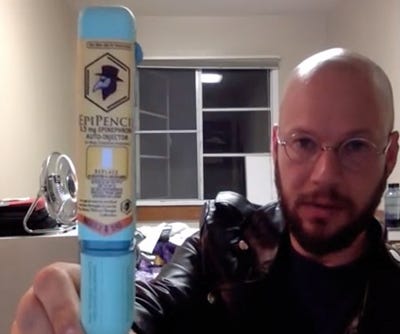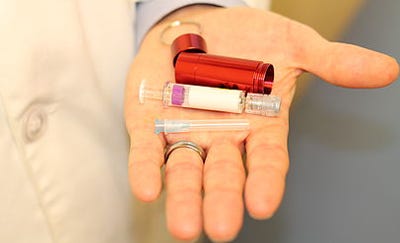DIYers See Opportunity in EpiPen Price Hike Fiasco
September 23, 2016
At least two enterprising DIYers have been touting their own low-cost epinephrine injectors in the wake of EpiPen maker Mylan's price hike controversy.
Maureen Kingsley
|
Michael Laufer holds up an "EpiPencil." [Image courtesy of Michael Laufer] |
A mathematics PhD and a Minnesota physician are among those who have taken it upon themselves to design alternatives to Mylan's EpiPen, a lifesaving device for severe allergy sufferers that has been mired in controversy because of huge price hikes.
Michael Laufer, a graduate student in the mathematics PhD program at City University of New York, has created a so-called "EpiPen hack" dubbed EpiPencil from low-cost and relatively-easy-to-obtain materials. Laufer's device combines an off-the-shelf needle injector marketed to diabetics with a syringe loaded with the correct dose of epinephrine.
During a recent interview with The Parallax, Laufer demonstrated assembly and operation of his DIY EpiPencil device. Laufer was able to load the syringe within 3 minutes, assemble the auto injector, and then provide himself with a 0.3 mm injection of saline, according to The Parallax.
Ambitious (and cost-savings-motivated) souls wishing to construct their own EpiPencil at home according to Laufer's instructions would need to buy the auto-injector, syringes, needles, and epinephrine (via doctor prescription) separately. Laufer's website provides links to each of the components, except the drug itself, epinephrine.
Next, the individual would load the syringe with the correct dose of epinephrine--again, based on a doctor's prescription--and screw together the auto-injector.
Laufer estimates that those following his instructions would pay roughly $35 to fully assemble each EpiPencil, versus the hundreds of dollars it costs for an EpiPen two-pack. EpiPen's maker, Mylan, has been taking a great deal of flack because the cost of an EpiPen two-pack has risen from $100 in 2007 to $600 in 2016. The company's damage control has included offering coupons and launching a generic version to reduce the cost to $300.
While Laufer's EpiPencil is certainly low-cost and seemingly easy to assemble and use, it is also worth noting that it is not being assembled amid regulated mass production in an FDA-registered facility. There are legitimate questions, then, regarding the device's sterility (or lack thereof), reliability, and safety in a life-or-death anaphylaxis situation.
|
The AllergyStop device (Image courtesy of AllergyStop) |
Taking the FDA Route
Douglas McMahon, a practicing physician at the Allergy and Asthma Center of Minnesota in Eagan, has also created an EpiPen alternative, the AllergyStop device. In contrast to Laufer, however, McMahon is not encouraging patients and caregivers to build his device themselves; rather, he is attempting to gain FDA clearance to make and market the product in the United States. In a recent Fortune article McMahon estimates the cost of his device would be around $50.
The AllergyStop device features patient-specific needle lengths and epinephrine doses based on patient BMI, according to McMahon's website. The device case is described as "palm sized" and contains a compartment for antihistamine medication for less-severe allergic reactions. As of midday, September 23, 2016, McMahon's Indiegogo fundraiser was at about $10,300, with a flexible goal of $200,000.
"Overall, AllergyStop is an inexpensive device due to the low cost of epinephrine," the Indiegogo page reads. "However, completing quality testing and gaining FDA approval for AllergyStop is expensive."
Mylan Responds
For its part, EpiPen marketer Mylan stands by its product's regulatory approval, prescription-only status, and safety record.
"EpiPen Auto-Injector is a complex prescription product designed to administer epinephrine, the only first-line treatment for anaphylaxis, quickly and properly in an emergency situation...The more than 15 critical component parts in this device must work every time without fail," the company told Qmed in a shared statement.
Mylan's CEO, Heather Bresch, testified before Congress this week, explaining, among other things, that the company's profit per Epi-Pen two-pack sold is about $100. Regarding that figure, Marianne Udow-Phillips, director of the University of Michigan's nonpartisan Center for Healthcare Research and Transformation, was quoted in USA Today as saying, "Taking [Bresch's] $50 per EpiPen at face value, I would describe that as a very good [profit] margin on a product where we know the drug itself costs something like $1 and the device was developed long before Mylan bought it. It is likely that the R&D cost for this device was recovered long ago. Whether a continuing profit margin of $50 per device is 'reasonable' or not is a judgment question."
Last month, Mylan announced it would launch the first generic version of the EpiPen auto-injector at a list price of $300 per two-pack carton, and double eligibility for its patient-assistance program.
Maureen Kingsley is a contributor to Qmed.
Like what you're reading? Subscribe to our daily e-newsletter.
About the Author(s)
You May Also Like



.png?width=300&auto=webp&quality=80&disable=upscale)
